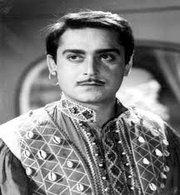Yousuf Khan
 |
| Name |
Yousuf Khan |
| Height |
|
| Nationality |
Pakistani |
| Date of Birth |
1929 |
| Place of Birth |
Kasur |
| Famous For |
Acting |
Yousuf Khan, Actors is famous for Acting, Pakistani celebrity. Born on 1929
He may have started his career as a second lead but veteran actor Yousuf Khan — the first actor in Pakistan to complete a Golden Jubilee in Lollywood — became a force to reckon with as he matured as an actor. He worked extensively in films during the 50 years, starring in over 400 movies and making a name for himself first as a romantic hero of Urdu films, and later as an action hero in Punjabi and Pushto cinema.
Born in Kasur in 1929, Yousuf belonged to a family that migrated to Pakistan soon after Partition. He recalled during the latter part of his career that it was the bloodshed he witnessed during that time that made him a true Pakistani, and to love this country like no one else. The late film veteran was very vocal against the airing of Indian films on television, the use of Indian singers in local films and the government’s recent decision regarding the removal of ban on the public screening of Indian films in cinemas throughout Pakistan. He was considered to be the most powerful and influential man in Lollywood, and his death on September 19 2009 due to heart failure can be termed as nothing short of a blow to the already ailing local film industry.
It was his love for Pakistan that saw Yousuf choose a career in films in the first place. Despite not being supported by his family in the decision at first, he was adamant and vowed to make it big. His struggle as an actor is reminiscent of Lollywood itself —starting slowly, becoming a sensation and then fading away towards the end.
Yousuf started his career in the then newly formed Lahore film industry with Parwaaz (1954), eventually stopping work due to old age and health complications some five decades later.
At the time of his debut, Lollywood was ruled by Sudhir, Aslam Pervez, Santosh Kumar and Darpan. But the arrival of dashing actors like Mohammad Ali and Waheed Murad heralded an era wherein the hero was smart, young and energetic.
Yousuf Khan had the good looks being a Pathan, and he had fair skin and charisma that drove the female fans crazy. Despite all that, and starring in Hasrat (1958) opposite Santosh; Laggan (1960) with Aslam Pervez; and Jawab Do (1974) with Darpan, he was not the first choice actor during the initial days of his career. Films like Kahmosh Raho (1964), Maa Baap (1966) and Taj Mahal may have made him popular but he was cast as the second lead opposite stalwarts Mohammad Ali and Waheed Murad, who themselves were new arrivals on the scene.
But determination and persistence saw him in the lead role in 1973’s Ziddi, the film that not only got him the recognition he deserved but also the stardom that initially eluded him. The flick made him a front runner in Urdu films where he was usually cast as the second lead. With the passage of time Urdu films gave way to the gandasa culture, and Yousuf was there to embrace it.
He starred in numerous Punjabi flicks, the most famous during the ’70s and ’80s being Japani Guddi, Chann Puttar, Babul, Khatarnak, Sharif Badmash, Sohni Mahiwal and Allah Rakha. He survived the Sultan Rahi era by churning out his own hits, but during the late ’80s he moved on to character roles, something Rahi didn’t ever do.
But Yousuf still had presence in Urdu cinema and he made it felt in films such as Bharosa, Gharnata, Nagin, General Bakht Khan, Khuda Gawah and Umar Mukhtar. The last two saw him being paired with Nadeem in double-version films (Punjabi dubbed in Urdu) and even then he shone like the star he was.
He shared a brilliant rapport with his co-stars be it his contemporaries Sudhir, Habib, Adeeb or junior colleagues like Mohammad Ali, Waheed Murad, Munawwar Zarif or even Sultan Rahi. He worked in many hit and flop films with Mohammad Ali such as Khamosh Raho (1964), Taj Mahal (1968), Dil-i-Betaab (1969), Phool aur Sholay (1976), Takrao (1978), Wadda Khan (1984) and Ghulami (1985). But it was his hit pairing with Sultan Rahi in Punjabi cinema that not only supported his career but also helped Rahi succeed as a leading action man. Together the two starred in over 20 films in 30 years — from Susral (1962), Khoon da Darya (1973), Seedha Raasta (1974), Sharif Badmash (1975), Khooni (1975), Yaar da Sehra (1976), Yarana (1976) to Khuda Gawah (1993).
With Sultan Rahi’s untimely death, Punjabi cinema lost an icon in the ’90s, but Yousuf made a resurgence in the new millennium, playing the title role in Buddha Gujjar in an attempt at revival. His last film, Arrain da Kharak, wasn’t as successful as he had hoped it would be, but it was a befitting farewell by a self-made artiste. His performances in Sohni Mahiwal, Chann Veer, Bau Ji and Tere Ishq Nachaya are still regarded as top notch by an actor in Punjabi cinema, and it is for his collective work in mainstream cinema that he was conferred the Presidential Pride of Performance Award along with many other national awards.
Yousuf Khan lived and died on his own terms, like the lines of the famous song filmed on him: Zindagi ja chorr de peecha mera… (O life, leave me alone now) from the film Jawab Do. The lyrics: Aakhir main insaan hoon, patthar to nahin… (after all, I’m human and not hewn out of stone) tell his story. Rest in peace, Yousuf Khan, for your work here is done.